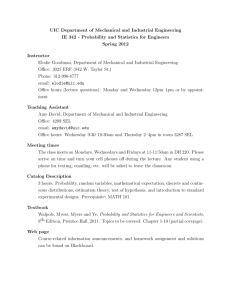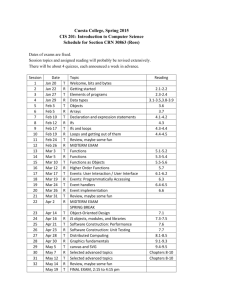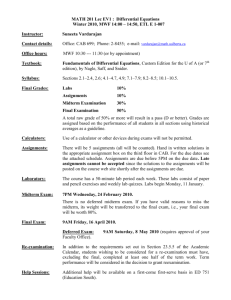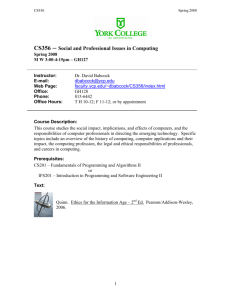CRIMINAL PROCEDURE 311B
advertisement
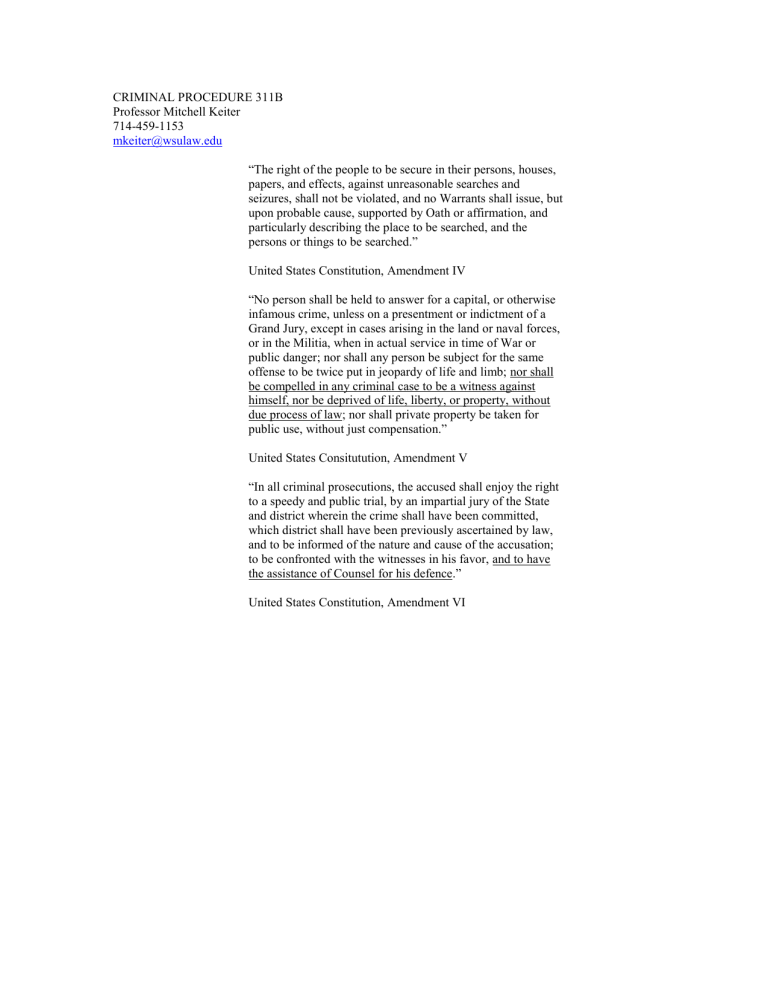
CRIMINAL PROCEDURE 311B Professor Mitchell Keiter 714-459-1153 mkeiter@wsulaw.edu “The right of the people to be secure in their persons, houses, papers, and effects, against unreasonable searches and seizures, shall not be violated, and no Warrants shall issue, but upon probable cause, supported by Oath or affirmation, and particularly describing the place to be searched, and the persons or things to be searched.” United States Constitution, Amendment IV “No person shall be held to answer for a capital, or otherwise infamous crime, unless on a presentment or indictment of a Grand Jury, except in cases arising in the land or naval forces, or in the Militia, when in actual service in time of War or public danger; nor shall any person be subject for the same offense to be twice put in jeopardy of life and limb; nor shall be compelled in any criminal case to be a witness against himself, nor be deprived of life, liberty, or property, without due process of law; nor shall private property be taken for public use, without just compensation.” United States Consitutution, Amendment V “In all criminal prosecutions, the accused shall enjoy the right to a speedy and public trial, by an impartial jury of the State and district wherein the crime shall have been committed, which district shall have been previously ascertained by law, and to be informed of the nature and cause of the accusation; to be confronted with the witnesses in his favor, and to have the assistance of Counsel for his defence.” United States Constitution, Amendment VI COURSE DESCRIPTION: Criminal Procedure will review and analyze United States Supreme Court decisions that interpret the Fourth, Fifth and Sixth Amendments to the United States Constitution. Whereas substantive criminal law is derived from penal codes enacted by state legislatures, and historical doctrines developed by English courts over the centuries, criminal procedure is shaped by (recent) Supreme Court cases. Unlike Criminal Law, the cases in the textbook do not merely reflect the law, they create it. Accordingly, this class will focus on the case readings intensively. The textbook is Criminal Procedure: Constitutional Constraints Upon Investigation and Proof (Fifth Edition), by James J. Tomkovicz and Welsh S. White. There is no secondary Dressler-like book assigned as required reading. The reading load, however, will be heavier than last semester’s. There will be some significant changes in how I teach this class as opposed to last semester’s. One is the above-described difference between the two subjects and the nature of the casebook. This semester, you will not read two similar cases with disparate outcomes, reflecting different rules for different jurisdictions and different eras. The cases all emanate from the U.S. Supreme Court. Moreover, you will notice that each section’s cases are usually presented in chronological order. The cases are not independent of one another, each one is decided in accordance (or, occasionally, in rejection of) the principles announced in the prior cases. The caselaw is thus an ongoing stream, sometime meandering in different directions, with various tributaries, rather than discrete and separate puddles. We shall therefore discuss these cases with more intensive analysis than was applied in Criminal Law. The “rules” will not be found in a separate hornbook but the cases themselves. Central to mastering the cases will be the examination of several “problems” found at the end of each chapter. These cases are adapted from actual cases decided by lower federal and state courts, which face the challenge of determining the law in a specific situation, being guided by only a few U.S. Supreme Court cases, none of which are directly on point factually. Students, like these lower court judges, must determine which cases are stronger authority, and in the process, explain which facts were most central to the U.S. Supreme Court’s decision in the prior case---and why. Due to the importance of the cases, I expect students to brief them—for your own benefit. The brief should contain the following: (1) a BRIEF recitation of the OPERATIVE FACTS, which is usually possible in 2-3 sentences; (2) the issue facing the court; (3) the reasoning of the Court’s majority (this can be done with one or two sentence-long bullet points); (4) the reasoning of the dissent; and (5) a single sentence description of the Court’s holding (underlined, in capitals or bold letters). I shall collect one brief a week to monitor your progress. Although briefs will facilitate your pre-class preparation, there are too many cases for you to absorb so much material. So I recommend that you pare the info down to index cards, with just the case name, the facts (one sentence) and the holding. This will help you recall everything you need for the exams. PREPARATION: I have provided not only the reading assignments but also the assigned problems at the end of each section. I expect students to take full advantage of this notice. Students may consult with their study partners prior to class. I do not expect students to come to class unable to participate in discussions, describe assigned cases, or turn in a brief. Likewise, I do not expect students to be unable too say a single word about an assigned case for the day simply because their computer is not on the right page. I understand if you can not memorize every word of the case---neither can I. But I do expect students to be able to recall at lea tone or two sentences worth of facts and then explain how the case compares to others regarding the same issue. ATTENDANCE: Attendance is an absolute prerequisite to law school success. Although there may be occasional emergencies that preclude attendance, students are expected to attend punctually every class. There will be a sign-in sheet distributed at the beginning of class. A student who is absent from more than four classes may be dropped from the class. Furthermore, because the class is only 90 minutes long, students are expected to remain in their seats throughout class absent significant physical need. For the evening class, there will be a break after 90 minutes. SCHEDULE AND OFFICE HOURS: This afternoon (B) section will meet every Monday and Wednesday from 2:45 until 4:15. The evening (C) class will meet Mondays from 6:30 until 9:45. There will be no class on Wednesday April 4 or Monday April 9. My general office hours will be Wednesday from 4:30 to 8:30, but I can make alternative arrangements to accommodate students where necessary GRADING: There will be a 90-minute closed book midterm examination, scheduled for March 26. It will count for 25 percent of the student’s overall grade. The final examination will be worth 75 percent, although these raw scores may be adjusted according to a student’s participation, preparedness and punctuality. COURSE OUTLINE: The class will first cover the Fourth Amendment, which will take us up to the midterm. We shall examine what constitutes a “search” so that Fourth Amendment considerations even arise in the first place (Chapter One); the requirements of probable cause (Chapter Two) and warrants (Chapter Three); those “exceptional” categories of cases where a warrant is not required (Chapter Four); and the way the Court construes the imperative of “reasonableness” in evaluating searches and seizures (Chapter Five). After that, the class will cover confessions, which implicate the Fifth Amendment guarantee against compelled self-incrimination. The class will examine Due Process considerations (Chapter Seven) general rules regarding confessions (Chapter Eight),, and the right to counsel in the context of confessions (Chapter Ten). Next, we shall cover identifications, which involve both Fifth Amendment Due Process considerations (Chapter Twelve) and Sixth Amendment Right to Counsel issues (Chapter Eleven). Finally we shall examine the remedy of excluding evidence from trial when the various constitutional guarantees described above have been violated (Chapters Thirteen and Fourteen). READING LIST: The following list includes the assigned cases, the “note cases,” which are presented in synopsis form, and designated with only one case name, and the assigned problems. The bold case is the one whose briefs I shall collect. The list is designed for use by both the afternoon students and evening students. For the evening students, whatever is covered by the afternoon students will be covered in hour first 90 minutes, and the remaining material will be covered in the second 90 minutes. There is also a supplement to the textbook. This may be found at www.lexisnexis.com/lawschool/ under “study aids.” Some assignments (of last year’s cases) appear there. The list is ambitious. I will not be disappointed, (or surprised), if I drop some material along the way. DATE CHAPTER CASES PAGES PROBLEMS Katz v. United States United States v. White Smith v. Maryland California v. Ciraolo Bond v. United States Oliver; Knotts 5-10 10-16 17-24 24-32 32-36 31-32 Kyllo v. United States 36-47 [2, 4, 6, 9, 11] Spinelli v. United States Illinois v. Gates Whren v. United States Pringle 57-69 69-86 86-91 84 [2-6, 8, 10-11] Illinois v. Wardlaw Alabama v. White Florida v. J.L. 427-436 437-441 441-444 [11-12, 15-19] SEARCHES AND SEIZURES CHAPTER ONE Jan. 17/22 Threshold Issues Jan. 22 Threshold Issues CHAPTER TWO Jan. 24/29 Probable Cause/ CHAPTER FIVE (A)(3) Jan. 29 Reasonable Suspicion CHAPTER THREE Jan. 31/Feb. 5 Warrants---Need and Preparation Feb. 5 Warrants---Execution United States v. Watson 105-116 Knowles 187 Atwater v. Lago Vista 117-132 United States v. Grubbs Supp 3-7 Franks; Connelly; Coolidge 145-46 Andresen v. Maryland 132-139 Maryland v. Garrison Wilson v. Arkansas Banks 139-144 146-149 151 [6, 3, 4, 12] CHAPTER FOUR WARRANTLESS SEARCHES Feb. 7/12 Search Incident to Arrest Chimel v. California United States v. Robinson New York v. Belton Thornton Payton v. New York 166-175 176-186 188-195 195 197-208 [1, 3, 9-11, 2] Feb. 12 Vehicle Searches Chambers v. Maroney California v. Carney California v. Acevedo Wyoming v. Houghton 238-243 252-258 268-277 278-285 [5, 1, 7, 10] Feb. 14/19 Exigent Circumstances Warden v. Hayden 223-225 Welsh Brigham City 225 Supp 24 [1, 3, 4-5, 8-9] Feb. 19 Consent Searches Schneckloth v. Bustamante318-328 United States v. Matlock 334-337 Illinois v. Rodriguez 338-345 Georgia v. Randolph Supp 8-22[3, 5, 4, 7, 9-11] Feb. 21/26 Detentions Terry v. Ohio Dunaway v. New York U. S. v. Mendenhall Florida v. Bostick California v. Hodari D. 373-386 387-392 392-401 402-410 413-420 [8, 4, 3, 5, 7] Feb. 26 “Plain View Plus” Horton v. California Arizona v. Hicks Minnesota v. Dickerson Michigan v. Long Mimms; Wilson Maryland v. Buie 352-360 360-365 [1, 3, 4, 9, 8] 482-488 475-481 481 488-494 [23-26, 30] Feb. 28/Mar. 5 Special Needs Michigan Dept. v. Sitz Indianapolis v. Edmund Illinois v. Lidster Skinner v. RLEA Chandler v. Miller Von Raab; Veronia; Earls 518-525 526-536 537-541 541-555 559-565 556-558 [10, 7, 5, 8, 6] Mar. 5 Body Searches Schmerber v. California Winston v. Lee 588-590 590-594 [3, 4, 6, 7, 9] Voluntariness Brown Spano v. New York Colorado v. Connelly Mincey 645 657-663 664-670 663 [1, 5-6] Mar. 7/19 Self-Incrimination Privilege Miranda v. Arizona 681-698 New York v. Quarles 699-708 Dickerson v. United States 709-721 [1-2] Mar. 12/14 Spring Break Mar. 19 Midterm Review [End of material to be covered on midterm] CONFESSIONS Mar. 21/Mar. 26 Custody Interrogation Mar. 26 Midterm Mar. 28/Apr. 2 Invocation Berkemer v. McCarty Yarborough v. Alvarado Stansbury; Mathiason 723-729 730-740 729 [2, 4, 6, 9] Rhode Island v. Innis Illinois v. Perkins Fulminante 746-755 755-762 763 [1-2, 4-5, 10, 7] Michigan v. Mosley Edwards v. Arizona Bradshaw Davis v. United States Smith Minnick v. Mississsippi 784-791 791-798 807 798-806 807 808-815[3-5, 8, 14, 18-19] [The March 28 class will be recorded. It will be broadcast, along with the April 2 afternoon lecture, on the evening of April 2. Evening students are welcome to attend the afternoon lectures if they choose.] Apr. 2 Midterm Post-Mortem Apr. 4/9 No Class Apr. 11/16 Confessions and Counsel Massiah v. United States Brewer v. Williams United States v. Henry Kuhlmann v. Wilson Cobb 853-857 858-871 875-884 886-892 873 [2, 5, 10] Identifications and Counsel United States v. Wade Kirby v. Illinois United States v. Ash 903-918 920-926 926-936 [2, 5] Identifications and Due Process Stovall v. Denno Manson v. Brathwaite 941-945 945-958 [4-7] History Weeks v. United States Mapp v. Ohio Withrow 969-973 (Skim) 973-983 (Skim) 986 Standing Limitation Alderman Rakas v. Illinois Olson Payner Minnesota v. Carter 989-991 991-1004 1004 1006 1007-1016 [1-2, 5-6] Independent Source/ Inevitable Discovery Silverthorne Lumber v. U.S.1022-1023 Murray v. United States 1023-1030 Nix v. Williams 1030-1038 [2-3, 7-8] Good Faith United States v. Leon Evans IDENTIFICATIONS Apr. 16 EXCLUSIONARY RULE Apr. 18/23 Apr. 23 1100-1120 1125 [5-6, 8-10] Additionally, there we shall make up the missed three hours from April 4 and 9. These make-up section will be held twice, to avoid student conflicts; students may attend either. In the second 90 minutes, we shall review my final exam from last year (which will be posted prior to class for your preparation). In the first part, we shall cover the following: Attentuation . Wong Sun.v. United States 1045-1050 Oregon v. Elstad 1062-1075 United States v. Patane 1087-1093 Hudson v. Michigan Supp. 27-45 [2, 4-5, 7, 9]


